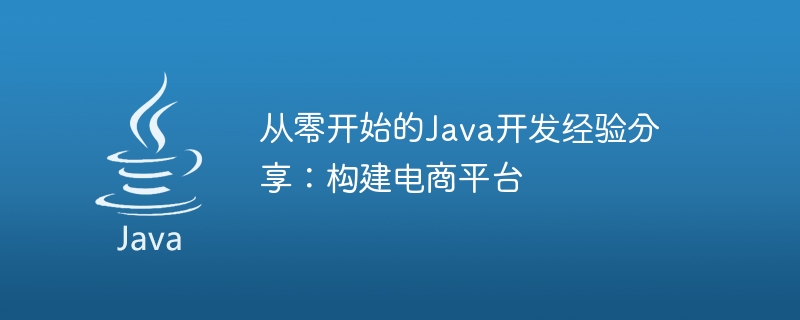

Sharing Java development experience from scratch: building an e-commerce platform
As a beginner, I have been learning Java development recently and decided to use my Learn the knowledge to build a simple e-commerce platform. In this article, I will share with you my experience and learning process.
The first step is of course to install the Java development environment. I chose to install the Java Development Kit (JDK) to write and run Java code. After the installation was completed, I prepared an integrated development environment (IDE), Eclipse. This IDE provides many useful features such as code auto-completion and debugging. I spent some time getting familiar with Eclipse's interface and features in order to write code more efficiently.
Next, I started to learn the basic syntax and concepts of Java. I started by understanding the basics like variables, data types, and operators, and progressed to more advanced concepts like conditionals, loops, and arrays. I consolidated the knowledge I learned by reading tutorials and reference books while writing small programs.
After mastering the basic Java syntax, I started to learn object-oriented programming (OOP). This is one of the core concepts of Java and one of the necessary skills for building an e-commerce platform. I learned concepts such as classes, objects, inheritance, polymorphism, etc., and understood their usage through practice.
On the basis of object-oriented programming, I began to learn Java's core class library. These libraries provide many useful functions and tools that can help us build e-commerce platforms more easily. For example, I learned how to use Java container classes to store and manage data, how to use IO classes to read and write files, how to use network programming classes to communicate with clients, and so on.
As my learning progressed, I decided to start building my e-commerce platform. I first designed the basic architecture of the platform, including user management, product management, order management and other modules. Then, I started writing code according to the designed architecture. In the process of writing, I gradually discovered some problems and learned how to solve them. For example, I learned how to use exception handling to deal with possible errors in the program, how to debug and test the code, and so on.
After completing the coding work, I started functional testing and performance testing. I test the stability and performance of the platform by simulating user behavior and increasing load. During the testing process, I discovered some performance bottlenecks and bugs and solved them by optimizing and modifying the code.
Finally, I deployed my e-commerce platform to a server so that other users can access and use it. I chose a cloud server and installed Apache Tomcat as my web server. I successfully deployed my e-commerce platform to the server by configuring Tomcat and uploading the necessary files.
Through this project, I learned a lot of knowledge and skills about Java development. I learned how to use Java's various features and libraries, how to design and build a complex application, and how to solve and debug problems. This project also made me more familiar with the entire development process, from requirements analysis to deployment and launch.
Although I am just a beginner, I believe that through continuous learning and practice, I can become an excellent Java developer. I hope that by sharing my experience, I can help other beginners and make it easier for them to get started and master Java development.
The above is the detailed content of Java development experience sharing from scratch: building an e-commerce platform. For more information, please follow other related articles on the PHP Chinese website!




